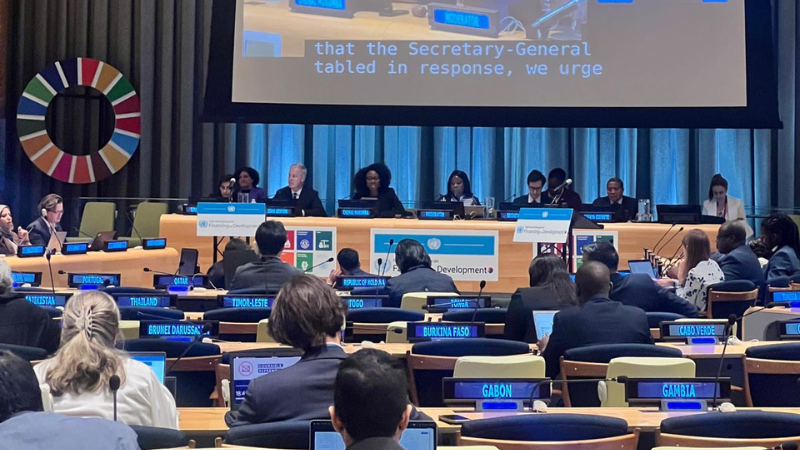Some representatives of United Nations Member States and experts endorsed the developing countries’ long-standing call for a UN Tax Convention during the High-level Dialogue on Financing for Development this Wednesday (20 Sep), in which the Global Alliance for Tax Justice (GATJ) participated together with the other members of the Civil Society Financing for Development (CS FfD) Mechanism, in New York (USA).
Check out some highlights of the dialogue on “Promoting inclusive and effective international tax cooperation and mobilising domestic resources”.
Thabo Mbeki, chair of the High-Level Panel on Illicit Financial Flows:
“The only process that can show inclusivity, balance and effectiveness is the United Nations. We strongly recommend a Framework Convention on International Tax Cooperation as proposed by the UN Secretary General in his report on promotion of international cooperation.”
Magdalena Sepúlveda, commissioner at the Independent Commission for the Reform of International Corporate Taxation (Icrict):
“Expectations were placed on the OECD process to end multinationals’ tax avoidance. The outcomes were not in favour of developing countries. The United Nations is the appropriate forum to make international tax cooperation fully inclusive and more effective.”
"Expectations were placed on the @OECD process to end multinationals' tax avoidance. The outcomes were not in favor of developing countries. The @UN is the appropriate forum to making international tax cooperation fully inclusive and more effective"
Our commissioner @Magda_Sepul pic.twitter.com/rR7ybr56Tv— Icrict (@icrict) September 20, 2023
Alicia Bárcena, Minister of Foreign Affairs of Mexico:
“It is true that each country must assume its responsibilities through national efforts, but we also advocate for five things: (1) the search for mechanisms to alleviate the debt of developing countries, particularly middle-income and small island States; (2) the reform of international financial institutions, in particular the multilateral development banks to open up more flexible lines of financing for middle-income countries; (3) the mobilisation of international resources that do not generate debt – the urgent redistribution of Special Drawing Rights is an example – and, of course, the Secretary General’s proposal to stimulate the SDGs; (4) support the African Group’s call to advance the design of inclusive tax instruments and frameworks and the creation of a convention that includes the payment of corporate taxes where they generate profits.”
Chenai Mukumba, executive director at Tax Justice Network Africa and member of GATJ coordination committee:
“Our current tax system, as we know it, was established in the 1920s and 1930s before many Global South countries were even in existence. But as early as the 1940s, Global South countries began to ask for the reform of international financial architecture at the League of Nations. This didn’t receive support from the countries that had established the system, so in the 1950s the OECD took up the role of the development of the international tax system, a platform that did not allow the effective participation of Global South States. And so today, as we sit in this room, we find ourselves at a historic juncture. Over the past few decades, various groupings of Global South coalitions have year in year out tabled proposals to shift the platform with international tax reform conversations happening back to the United Nations. After years of continuous efforts, last year the African Group resolution was adopted by consensus.
“The resolution spoke to two issues: that of inclusivity, as well as effectiveness. In order to address the issue of inclusivity, what we need is an intergovernmental forum where all Member States are able to participate on equal footing on a level playing field. We need a platform that is not only cognisant but responsive to the needs, concerns and priorities of all countries. The concern of duplication has been raised several times in response to this resolution, and this could not be further from the truth. What I just described earlier, a platform where all Members are able to participate on equal footing and on a level playing field, does not currently exist. The efforts of the African Group is really to establish a platform where there currently is none.
“The second concern raised by the African Group resolution is that of effectiveness. In Africa, where the report of the High Level Panel on Illicit Financial Flows that was chaired by his excellency Thao Mbeki, it was noted that we lost on an annual basis 50 billion dollars. Over the past few years, we saw an increase, as it has now doubled to almost 90 billion dollars. The importance of the reform of the tax system is that the countries do indeed have the sovereign right to collect taxes. IFFs due to tax evasion and avoidance prevent the exercise of this right. In light of the options that the Secretary General tabled in response to the resolution of the African Group, we urge Member States to move forward with option 2 to seek the establishment of a Framework Convention on International Tax Cooperation.”
“We need an intergovernmental forum where all member states can participate on equal footing at a level playing field. We need a platform that is cognisant and responsive to the needs, concerns, and priorities of all countries.”- @chenaimukumba.#TaxJusticeAfrica… pic.twitter.com/NUg8ejwpAa
— Tax Justice Network Africa (@TaxJusticeAfric) September 20, 2023
For more information, see this database created by the CS FfD Mechanism that tracks statements by governments that support an intergovernmental UN tax body and/or UN Tax Convention.
